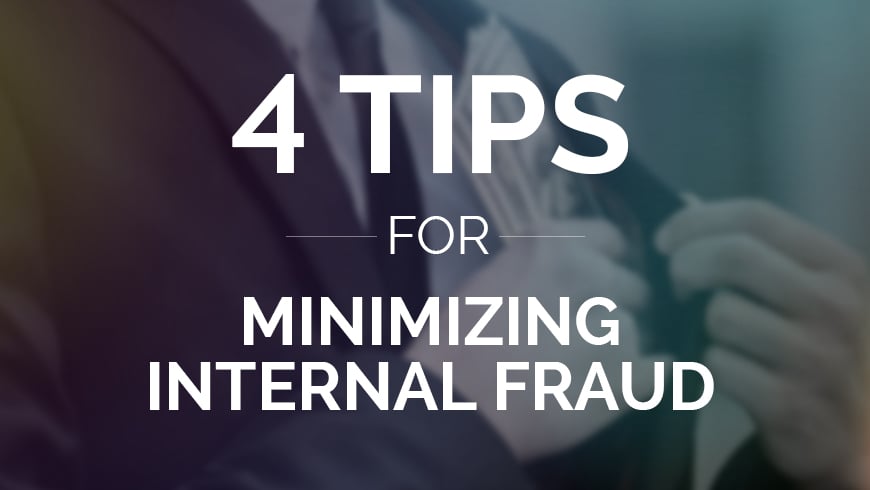4 Tips for Minimizing Internal Fraud
Published: Jan 28, 2016
Last Updated: Jan 19, 2024
Your company has internal security measures in place, and it has met many compliance requirements. But do these things mean your business is now immune to fraud? Probably not. Research shows that 75 percent of companies have fallen victim to fraud in the last year.
To make matters worse, 64 percent of businesses suffered financially from fraud. But interestingly, 81 percent of the companies that experienced fraud within the last year said an employee did it.
How can you minimize internal fraud? Read on.
What Motivates an Employee to Commit Fraud?
Let’s start at the beginning. To prevent internal fraud, we need to understand what motivates an employee to commit fraud. The Journal of Accountancy reports that most employees who commit fraud are first-time offenders, and they never enter their jobs intending to do the act.
So, why do they do it? The Journal suggests two reasons: dissatisfaction and financial pressures.
The more disgruntled the employee, the more likely he or she is to commit fraud.
“If we believe we are not being fairly treated or adequately compensated, statistically we are at much higher risk of trying to balance the scales,” reports the Journal.
Employees who are dealing with financial pressures in their lives are more likely o commit fraud to meet financial obligations. They may even be able to rationalize the fraud as something other than criminal activity. However, the employee mustalso have opportunity to commit and conceal the crime.
Tips for Preventing Internal Fraud
Deter Opportunity: To take away the opportunity to commit fraud, divide responsibility among employees. For example, don’t let one person control both the books and the assets. In other words, segregate personnel such that no one person can perform approval, reconciling, and controlling functions.
Have Audit Committees Independent of Management: If your company has stakeholders or shareholders, they should have their audit committee independent of management.
Establish Procedures for Reporting Questionable Behavior: If they’re not already in place, establish the procedures for the receipt and treatment of employee complaints. One of the most attractive options for doing so is a whistleblower hotline. After implementation of a whistleblower hotline, make sure to conduct periodic reviews of its effectiveness.
Create an Anti-Fraud Policy: Fraud can have many different meanings. It can be an employee misusing a reimbursement policy, stealing physical assets, using company assets to conduct a side business and more. To help employees understand what your organization considers to be fraud, create an anti-fraud policy. The policy should include how fraud will be investigated and what will be done to resolve it. Requiring employees to sign an acknowledgment of the policy ensures that there is accountability to reviewing the policy.
Adding the above to your controls environment can help deter fraud in your organization by showing company leaders are committed to detecting and preventing fraud.
About Debbie Zaller
Debbie Zaller is Chief Operating Officer at Schellman. Debbie is responsible for maintaining and driving operational results and executing the firm's strategic goals. Debbie oversees all daily operations of the firm while spearheading the development, communication and implementation of effective growth strategies and processes. Debbie has over 21 years of IT compliance and attestation experience. Debbie led the firm's Midwest, Southeast, and Northeast regions along with the national service lines of SOC 2 and Privacy service lines as Managing Principal before assuming the position of COO in 2021. Debbie holds a Master of Accounting degree from the University of Florida. She is a Certified Public Accountant, Certified Information Privacy Professional/United States, Certified Data Privacy Solutions Engineer, Certified Information Systems Security Professional, Certified Information Systems Auditor, and Certified Cloud Security Knowledge. She is currently an AICPA-approved and nationally listed SOC Specialist and speaker on various privacy topics. Debbie was on the AICPA Task Force for the Advanced SOC for Certification Exam, was a member of the Florida Institute of Certified Public Accountants Board of Governors and served on the Finance and Office Advisory Committee.




